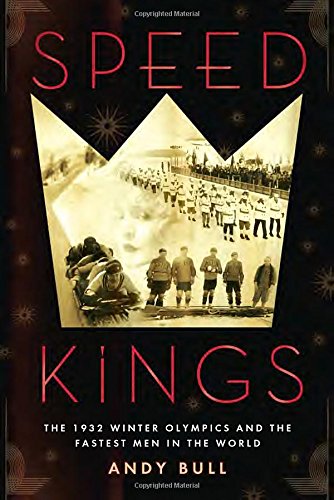Bull combines part history of the sport of "bobbing," part biography of several team members, and part story of how the Olympics came to Lake Placid in 1932 in this sporting tale. Although the team was comprised of four men, the focus here is on Billy Fiske, a young, wealthy boy who was the embodiment of speed and competition and in fact the central figure, the heart and soul, of the team. In fact, the story opens with Fiske's daring and unlikely landing of a crippled fighter plane in Britain during WWII and his resultant death. After setting the stage with Billy's heroic death and a brief chapter centered on the teenager's life and lifelong attraction to speed, the tale moves backwards to cover the roots of the sport of bobsledding in St. Moritz, the winter playground of the rich. Starting as a tourist event open to all that quickly became too dangerous for any but the most reckless, bobsledding was a risky, adrenaline-filled sport that drew high society and thrilled crowds. As it grew in notoriety, it required more and more skill to drive a bob, eventually leading this exciting and novel sport to be added into the line-up of the fledgling Winter Olympics.
The story, while focused more on Billy Fiske than on his other teammates, does look at the interestingly disparate backgrounds of the four men who would eventually bob for the US in 1932: Tippy Gray, Eddie Eagan, Jay O'Brien, and of course, Billy Fiske. Each man had a very different road to the Olympic team and Bull looks at their lives and how they either fell into or chose the sport that caught the public's imagination. In addition to the history of the sport and the lives of the men, Bull also focuses on the almost failed attempt to bring the Olympics to the small town of Lake Placid, the man behind the effort, and the personality conflicts and financial crises that plagued the whole endeavor.
Bull has done a lot of research but sometimes the narrative is overwhelmed by the information he shares and his choices about what to elaborate on and what to skim superficially didn't always feel the right way round. It is so wide-ranging and detailed that it doesn't always maintain an even narrative tension and feels very choppy. The story is quite long and drawn out in the run up to the Olympics and the late addition of some of the very important people is a bit disconcerting. But as a piece that paints a picture of a time period with the decadence of the Roaring Twenties giving way to the austerity and loss of the Great Depression as the world faced an uncertain future with possible war looming again, he does a good job. Despite the flaws in the narrative, that a small town in upstate New York would step in, when bigger donors balked, and give money, even in the depths of the Great Depression, to bring the Olympics to their town, that the public would so fully embrace the new sport of bobsledding, and that an American team, a long shot by now, would overcome dramatically warm weather conditions to capture the gold makes this a tale worth telling.
Thanks to the publisher and LibraryThing Early Reviewers for sending me a copy of this book for review.







No comments:
Post a Comment
I have had to disable the anonymous comment option to cut down on the spam and I apologize to those of you for whom this makes commenting a chore. I hope you'll still opt to leave me your thoughts. I love to hear what you think, especially so I know I'm not just whistling into the wind here at my computer.